
Latest News Regarding
Horn of Africa
Ethiopia government, Tigray forces to meet for first peace talks since conflict began
Ethiopia government, Tigray forces to meet for first peace talks since conflict began

Source: Reuters, Monday October 24, 2022
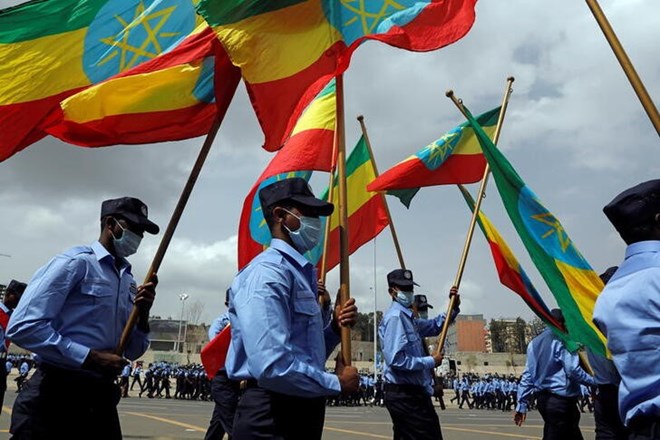
Addis Ababa police officers holding the Ethiopian national flags, in Addis Ababa, Ethiopia, June 19, 2021. REUTERS/Baz Ratner
NAIROBI, Oct 24 (Reuters) – An Ethiopian government delegation and rival Tigray forces were due to meet in South Africa for the first formal peace talks since war broke out two years ago.
The talks will take place as Ethiopian forces and their allies make significant battlefield gains in the northern Tigray region, where they have captured several large towns in the past week.
The war is rooted in a power struggle between the federal government and Tigray authorities, who led the country’s ruling coalition until Abiy Ahmed became prime minister in 2018.
The conflict has killed thousands, displaced millions and left hundreds of thousands on the brink of famine.
Ethiopia’s government said in a statement its delegation had left for South Africa to participate in the talks, which are being mediated by the African Union.
“The Government of Ethiopia views the talks as an opportunity to peacefully resolve the conflict and consolidate the improvement of the situation on the ground,” it said.
Kindeya Gebrehiwot, a spokesman for the Tigray forces, said the Tigrayan delegation had already arrived.
He said on Twitter the focus of the talks would be on immediate cessation of hostilities, unfettered humanitarian access, and the withdrawal of Eritrean forces, who have fought alongside Ethiopian federal troops during the conflict.
The Tigray delegation is being led by one of its top generals, Tsadkan Gebretensae, and spokesman Getachew Reda, an official familiar with the talks told Reuters.
The delegation arrived on Sunday on a U.S. military aircraft, accompanied by the U.S. special envoy to the Horn of Africa, the official said.
Both sides had committed to the talks in South Africa earlier this month, but they were delayed for logistical reasons.
Plastics are piling up in soil across the world warns UN environment agency
Plastics are piling up in soil across the world warns UN environment agency

© World Bank/Dominic Chavez Fruit and vegetables grow in a greenhouse outside Bamako in Mali.
Source: UN, Facebook Twitter Print Email17 October 2022 Climate and Environment
Plastics used in farming activities are accumulating in agricultural soil worldwide at an alarming rate, a new report by the UN Environment Programme (UNEP) published on Monday reveals.
Plastics are used extensively in agriculture, from plastic-coated seeds to protective wraps used to modify soil temperature and prevent weed growth over crops.
These synthetic materials also added intentionally to biosolid fertilizer, which is spread on fields, and are used in irrigation tubes, sacks and bottles.

© FAO/Giulio Napolitano Plastic covered seedlings.
Biodiversity, health impacts
While all these products have helped increase crop yields, there is growing evidence that degraded plastics are contaminating the soil and impacting biodiversity and soil health, the report warns.
Moreover, microplastics, such as the one used in some fertilizers, are also impacting human health when transferred to people through the food chain.
“There is only a finite amount of agricultural land available,” said report’s co-author Professor Elaine Baker from the University of Sydney. “We are starting to understand that the build-up of plastic can have wide-ranging impacts on soil health, biodiversity and productivity, all of which are vital for food security”.

Menos Plástico es Fantástico A.C Microplastics come in a large variety of sizes, colours and chemical compositions, and include fibres, fragments, pellets, flakes, sheets or foams.
Everything’s affected by plastic
UNEP’s experts explain that over time, big pieces of plastic can break into shards less than 5 mm long and seep into the soil.
These microplastics can change the physical structure of the earth underfoot and limit its capacity to hold water. They also can affect plants by reducing root growth and nutrient uptake.
Currently the single-biggest source of microplastic pollution in soil, is fertilizers produced from organic matter such as manure.
Although these can be cheaper and better for the environment that manufactured fertilizers, the manure is mixed with the same plastic microspheres that are known to be commonly used in certain soaps, shampoos, and makeup products.
While some countries have banned these microspheres, other microplastics continue to enter our water systems via discarded cigarette filters, tire components, and synthetic clothing fibres.

FAO/Hkun Lat A girl runs through deserted farmland in Mynmar’s Sagaing region.
What to do?
The report highlights that progress is being made to improve the biodegradability of polymers used in agricultural products.
However, some protective films – used to prevent moisture loss – are now being marketed as fully biodegradable and compostable, which is not always the case.
Bio-based polymers are not necessarily biodegradable, some may be as toxic as fossil fuel-based polymers, and their price is still an issue.
A solution proposed by the report authors are the so-called ‘cover crops’, which shield the soil and are not meant to be harvested.
These nature-based solutions can suppress weeds, counter soil diseases and improve soil fertility, but there are concerns they could reduce yields and increase costs, UNEP warns.
“None of these solutions are a magic bullet. Plastic is inexpensive and easy to work with, which makes trying to introduce alternatives a hard sell”, Ms. Baker explained.
However, the expert recommends governments to disincentivize” the use of agricultural plastics, following the path of the European Union, which earlier this year restricted certain types of polymers from being used in fertilizer.
“Now is the time to adopt the precautionary principle and develop targeted solutions for stopping the flow of plastic from the source and into the environment”, the Australian scientist underscored.
African Union sets Monday for start of Ethiopia peace talks
African Union sets Monday for start of Ethiopia peace talks

Source: Reuters, Saturday October 22, 2022

NAIROBI (Reuters) – Peace talks on the war in Ethiopia will start on Monday in South Africa, the African Union said on Friday, following earlier commitments by the government and Tigray forces to participate.
The Ethiopian government and its allies, which include Eritrea’s military, have been fighting Tigray forces in the north of the country on and off since late 2020. The conflict has killed thousands, displaced millions and left hundreds of thousands on the brink of famine.
Both sides had committed to talks earlier this month, but they were delayed for logistical reasons.
The African Union’s Peace and Security Council said on Friday it welcomed “mutual commitments to genuinely participate in the peace process”.
Redwan Hussein, national security adviser to Ethiopian Prime Minister Abiy Ahmed, has said the government will participate in the AU-led talks from Oct. 24.
Kindeya Gebrehiwot, a spokesman for the Tigray forces, did not immediately respond to a request for comment.
The peace talks are set to start just days after the Ethiopian army and its allies seized three large towns in Tigray, one to the northwest and two to the south of the regional capital Mekelle.
Tigrai TV, a media outlet controlled by the Tigray authorities, said on Friday their forces had released over 9,000 Eritrean and Ethiopian prisoners of war, including 500 women.
The station reported that the prisoners of war were released because the enemy is the Ethiopian government, not the frontline soldiers who they said were forced to fight.
Ethiopians protest against outsiders amid Tigray conflict
Ethiopians protest against outsiders amid Tigray conflict

Source: AP, Saturday October 22, 2022
Ethiopians protest against what they say is interference by outsiders in the country’s internal affairs and against the Tigray People’s Liberation Front (TPLF), the party of Tigray’s fugitive leaders, at a rally organized by the city administration in the capital Addis Ababa, Ethiopia Saturday, Oct. 22, 2022. The demonstrations were staged ahead of the expected start of peace talks in South Africa next week between the warring parties, with the U.S. saying Friday it supports the African Union’s efforts to mediate talks to stop fighting in Tigray. (AP Photo)
ADDIS ABABA, Ethiopia (AP) — Thousands of people in towns across Ethiopia staged demonstrations Saturday against what they say is interference by outsiders in the country’s internal affairs.
The rallies included one in the federal capital, Addis Ababa, where many such events have been held in the nearly two years since war broke out in the country’s northern region of Tigray.
Some demonstrators displayed banners accusing the U.S. of disrespecting Ethiopia’s sovereignty, while others singled out Tigray’s fugitive leaders for blame.
The Addis Ababa rally was organized by city authorities.
“We are keen to assure the world that we are always by his side and support the government’s call for our sovereignty,” said Jantirar Abay, deputy mayor of Addis Ababa, referring to Prime Minister Abiy Ahmed. “We oppose any threat and interference to the unity of Ethiopia and we ask the interfering countries to stop.”
The demonstrations were staged ahead of the expected start of peace talks next week in South Africa between the warring parties. The U.S. said Friday it supports the African Union’s efforts to mediate talks to stop fighting in Tigray.
Diplomats have expressed alarm over reports of civilian casualties in the region as Ethiopia’s federal military this week took control of the major town of Shire and the federal government expressed its aim to control Tigray’s airports and institutions. Eritrean troops are fighting alongside Ethiopian federal forces in Tigray.
U.S. officials have called on Eritrean forces to withdraw from Tigray and urged the parties to agree to an immediate cease-fire. The administrator of the U.S. Agency for International Development, Samantha Power, has described the human cost of the conflict as “staggering.”





The Associated Press reported Friday that dozens of women and girls have been raped and hundreds of civilians killed during fighting, which resumed in August after a lull. Roughly 40 girls and women between the ages of 13 and 80 were raped in the town of Sheraro in northwestern Tigray, according to an internal document prepared by Tigray’s regional Emergency Coordination Centre, which includes regional government bureaus, U.N. agencies and nongovernmental organizations.
The U.N. Security Council discussed the conflict in Ethiopia at a closed meeting Friday but didn’t issue a statement because of divisions among its 15 members.
Diplomats said Norway and the council’s three African members — Kenya, Gabon and Ghana — proposed a statement that would have expressed “grave concern” at reports of increased fighting in Tigray, called for an immediate cessation of hostilities, and urged the parties to recommit to dialogue. But Russia and China blocked its approval, the diplomats said, speaking on condition of anonymity because discussions were private.
“In the past week alone, we’ve seen a serious uptick in fighting and violence,” Linda Thomas-Greenfield, the U.S. ambassador to the U.N., said in a statement Friday. “The scale of the fighting and deaths rival what we’re seeing in Ukraine, and innocent civilians are being caught in the crossfire.”
The conflict, which began in November 2020, has spread from Tigray into the neighboring regions of Afar and Amhara as Tigray’s leaders try to break the blockade of their region.
USAID Administrator Critical of Ethiopian, Eritrean, and Tigrayan Forces
USAID Administrator Critical of Ethiopian, Eritrean, and Tigrayan Forces
Source: USAID Administrator Samantha Power posted on 16 October 2022 a statement titled “Intensifying Military Operations and Escalating Risk for Widespread Atrocities in Northern Ethiopia.“
Power expressed alarm at the expanding military operations by the Ethiopian National Defense Forces, Eritrean Defense Forces, and Tigray Defense Forces in northern Ethiopia, arguing that they risk increasing widespread atrocities and violence against civilians.
EU Deplores Situation in Northern Ethiopia
EU Deplores Situation in Northern Ethiopia
Source: The European Union issued a press release on 17 October 2022 calling for a halt to the offensive in northern Ethiopia.
The EU called “for an immediate halt to the joint offensives launched by Ethiopian National Defence Forces in collaboration with Eritrean Defence Forces, and a full withdrawal of Eritrean troops from the sovereign territory of Ethiopia. . . . The EU equally exhorts the Tigray Forces to refrain from any further military operations, and to cease hostilities in neighboring Amhara and Afar territories.”
Ethiopia: Leaders Should Face Punitive Measures if Civilians Targeted
Ethiopia: Leaders Should Face Punitive Measures if Civilians Targeted
Source: The International Crisis Group published a statement on 20 October 2022 titled “A Call to Action: Averting Atrocities in Ethiopia’s Tigray War.“
A seven-week Ethiopian and Eritrean offensive in Tigray Region risks degenerating into a still bloodier phase. Civilians are trapped in the line of fire. The ICG concludes that Ethiopian and Eritrean leaders are ignoring calls to halt the offensive and should be warned they will face punitive measures if they target civilians.
Stakeholders call for united fight against challenges facing Horn of Africa
Stakeholders call for united fight against challenges facing Horn of Africa

Source: The EastAfrican, By Rachel Kibui
Thursday October 20, 2022

A pastoralist herds goats and sheep in Isiolo, northern Kenya. Partners in the Horn of Africa have been urged to unite to fight common challenges facing the region and impacting communities.
Partners in the Horn of Africa have been urged to unite to fight common challenges facing the region and impacting communities. This was said last week during a virtual meeting in Nairobi, Kenya by regional stakeholders.
Currently, the region is facing one of the worst droughts in 40 years, leaving many people displaced and livestock lost. Loss of livestock affects the people around the Horn, as it is their primary source of income.
Over 18.5 million people are currently facing acute food shortage in Kenya, Ethiopia, Djibouti and Somalia alone. As the situation worsens, this number is anticipated to continue rising.
The region experiences other shocks and disasters, such as conflict, water shortage and disease outbreaks.
A convergence by stakeholders in the region on October 12, 2022 called for a multi-stakeholder approach towards building resilience to these shocks and ensuring sustainable solutions to the challenges being faced in the region.
The event, organised by the United States Aid for International Development (USAid) through the Horn of Africa Resilience Network (HoRN), drew participants from governments, the private sector and development partners.
Coordination platform
The HoRN serves as a coordination platform across Kenya, Ethiopia, Uganda, South Sudan, Somalia, and the Democratic Republic of Congo.
The programme works towards building resilience in areas that are hit by recurrent crises in the dry lands. Its key objectives are to strengthen regional and cross-border collaboration and improve evidence-based learning to inform regional, countries and USAid initiatives.
This year’s HoRN learning event coincided with the ongoing acute drought following failed rains in many areas, with some experiencing minimal rainfall.
Severe drought
In Somalia, for example, nearly half of the country’s estimated population, which accounts for more than 7.8 million people, is impacted by the ongoing severe drought. Additionally, 1 million people have been displaced since the beginning of the drought in 2021.
“The coping capacity of the most vulnerable has vastly reduced due to the impact of four consecutive seasons of poor rainfall, sharp increases in food prices and conflict,” said Laura Kate Bennison, Danwadaag Consortium Coordinator of the International Organisation for Migration in Somalia.
“Malnutrition that has resulted from the droughts has led to the loss of children in Somalia,” she added.
With the humanitarian situation deteriorating over the recent months especially in the South West State Bay region, migration to urban areas has been on the rise. Cities such as Mogadishu and Baidoa have received about 100,000 people displaced by the drought in 2022 alone. Most affected are women and children, who account for 83 per cent of the displaced persons.
Most of the 2.9 million internally displaced persons (IDPs) live in urban and peri-urban areas. Migration and subsequent urbanisation have caused sharp growth of key cities including Kismayo, Baidoa and Mogadishu. This has led to a lot of strain on city systems, resource competition and limited absorption capacity.
Armed conflicts
In her remarks, Amy Beeler, the Office Director of Economic Growth for USAid Uganda, said that armed conflicts and insecurity in the Horn of Africa amongst the pastoralist communities such as the Karamojong in Uganda, the Turkana in Kenya and the Topoza in South Sudan are negatively impacting development efforts in these areas.
The key drivers of the problem are water and pasture scarcity and illicit firearm trafficking among pastoralist groups. She called on the affected countries and bilateral USAid missions to incorporate conflict resolution and address the drivers of these conflicts across the agency’s interventions.
“There are also opportunities that can be tapped to build sustainable livelihoods in the region, including learning from regional interventions which are specific to particular countries,” she added.
With an example of Uganda’s Karamoja region, Ms Beeler said a study revealed that 70 per cent of livestock is sold in the Juba market. This, she added, pointed to the direction that there are opportunities to leverage market systems across the borders and lead to a reduction in the drivers of conflict along the borders.
Community involvement
Mitigation against these shocks also calls for community involvement at household level and to build their capacities rather than only focusing on public and private institutions and agencies, she said.
Recently, the Intergovernmental Authority on Development (IGAD) established an institution dedicated to early response. Dubbed the IGAD Centre for Pastoral Areas and Livestock Development (ICPALD), its mission is to ensure IGAD member states sustainably generate wealth and employment through livestock and complementary livelihood resources development in arid and semi-arid areas of the IGAD region.
Acting USAID Kenya and East Africa resilience team leader, Dr Ernest Njoroge, said the multi-sectorial expertise which the event attracted was commendable, adding that it had what it takes to address the current humanitarian challenges facing the region. He challenged participants to provide leadership in applying what they learned to strengthen coordination and partnership.
Dr Njoroge further called upon the team to provide critical evidence on resilience, engage the private sector on risk management financing and work with governments and communities in ensuring local ownership of resilience programming.
Somalia warns its fighters not to target non-combatant family members of Al Shabaab
Somalia warns its fighters not to target non-combatant family members of Al Shabaab

Source: Hiiraan Online, Friday October 21, 2022

Mogadishu (HOL) – Somalia’s Ministry of Defense has instructed the military and pro-government militia forces not to target wives and children of the Al Shabaab members in reprisal attacks.
On Tuesday, the Ministry of the Defense spokesman Brigadier General Abdullahi Ali Aanood said it is illegal to kill non-combatants and enemies who surrender.
We are telling the army about the government’s policy, the man who surrenders should be welcomed, and the wives and children of the militants should not be killed or harmed if they haven’t committed a crime or pose an immediate threat to soldiers’ safety. We are the government, and we wield moral superiority,” said Brigadier General Aanood.
The statement comes days after the governor of the Hiiraan region, Ali Jeyte Osman, called for targeting Al Shabaab members’ families in reprisal attacks. Security experts and rights groups expressed alarm at the open call for extrajudicial killings.
At the same news conference, Jeyte announced on Sunday that his administration would financially reward fighters with up to $25,000 for killing Al Shabab militants in the ongoing war in central Somalia.
Brigadier General Aanood added that Al Shabaab had abducted many young people and forced them to fight against the government against their will.
He called on young people in Al Shabaab-held areas to surrender to the government if sent to the frontlines. He promised them that the Somali army would welcome them.
Somali government forces backed by local pro-government militia groups liberated over 50 villages, killing over a thousand militants in the central Somali region of Hiiraan in the last three months.
Somalia signs major oil exploration agreement with Coastline
Somalia signs major oil exploration agreement with Coastline

Source: Hiiraan Online, Friday October 21, 2022
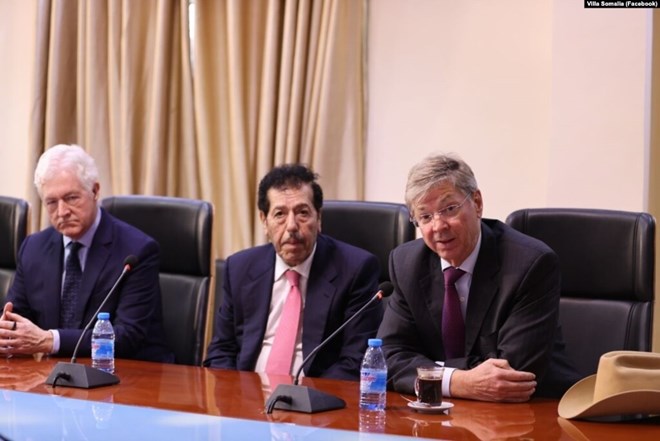
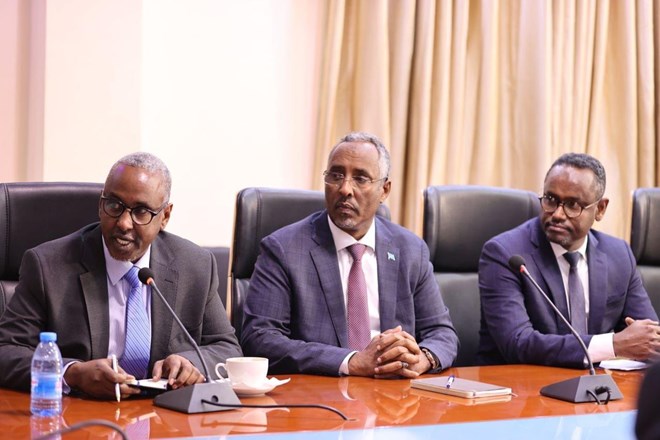
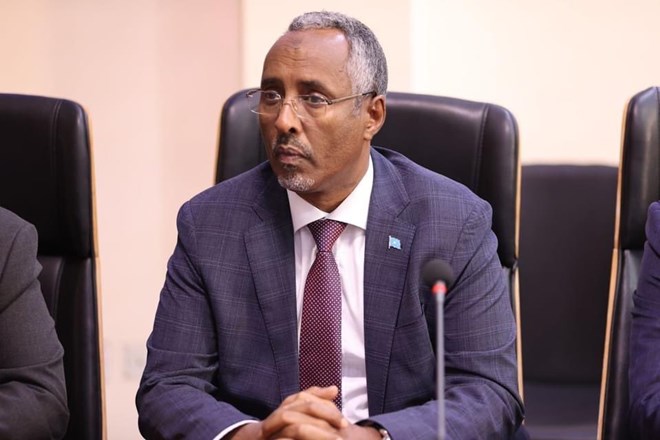
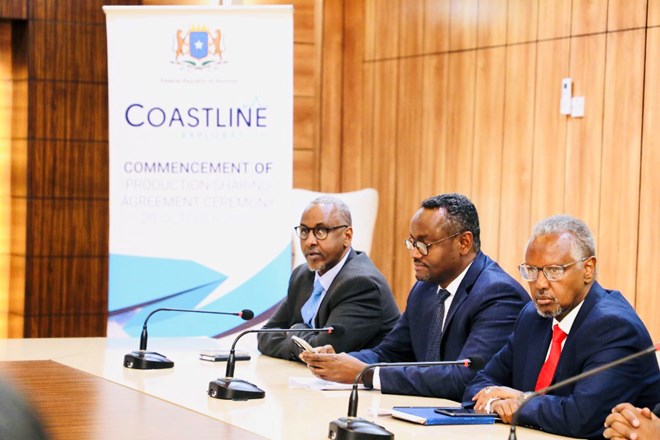
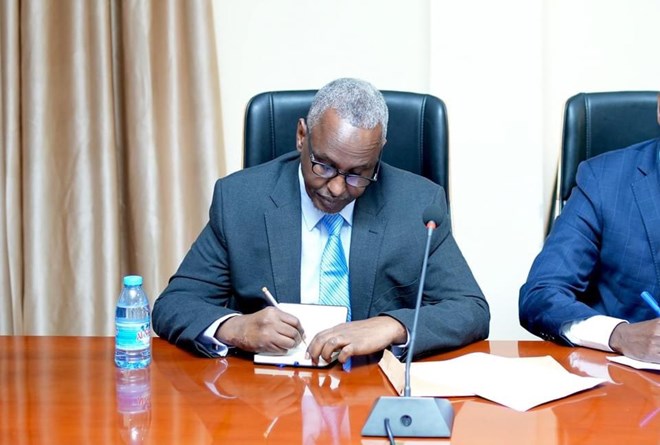
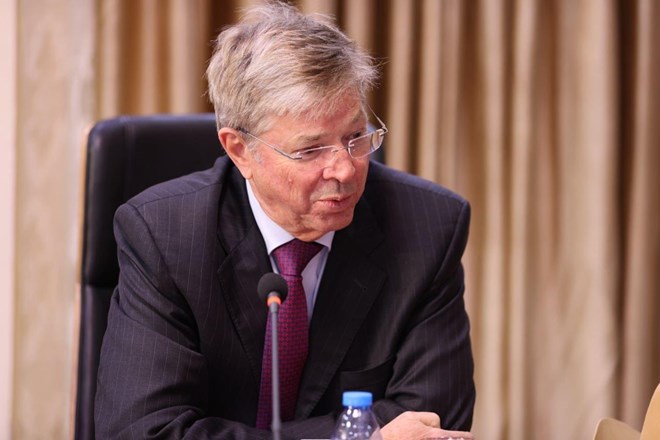
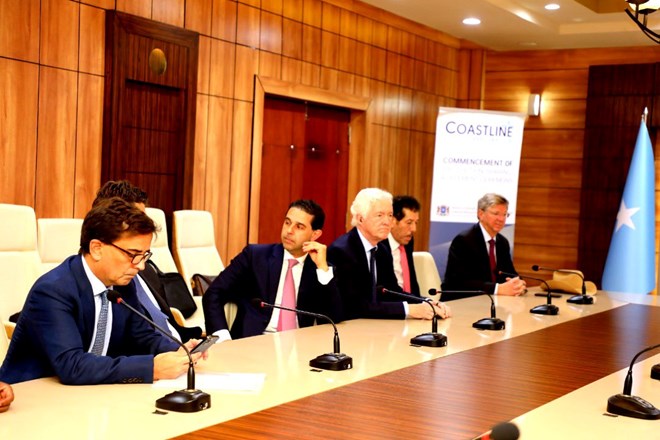
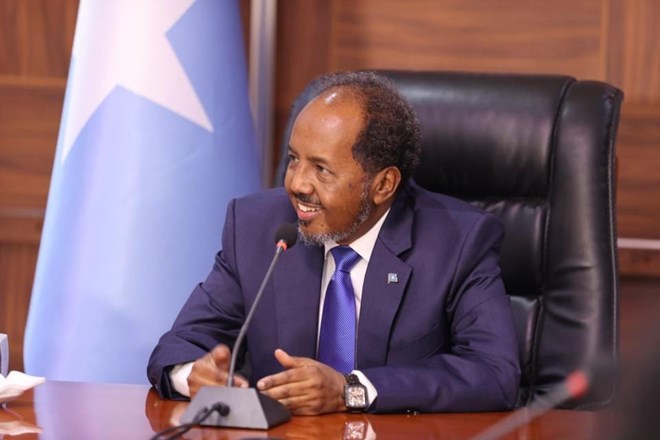

Mogadishu (HOL) – Somali government finalized a controversial oil production sharing deal with Coastline Exploration on Thursday.
The government said it signed the deal after five amendments were made to the original agreement that was reached in Istanbul in February.
“We reviewed the agreements signed in February 2022 to correct the agreements’ process and provisions. The Attorney General and international lawyers specifically proposed changes to certain articles in accordance with the laws of Somalia. There were five amendments made to the agreements, which are annexed to the agreements (deed of amendment of the PSAs).” Abdirizak Mohamed, the Minister of Petroleum and Minerals said.
Coastline Exploration, an upstream oil and gas company, confirmed that it signed seven PSAs with the Federal Government of Somalia. It estimates that approximately 100,000 barrels of oil a day will flow from each discovered field.
advertisements”Somalia is open for business. President Mohamud and the Federal Government of Somalia have approved Coastline Exploration’s Production Sharing Agreements and support our planned oil exploration programme,” the company said in a tweet.
Coastline added that it had paid a $7m signing bonus – one for each PSA – directly to Somalia’s Central Bank.
“Assuming our wells are successful, we expect to pay many millions more dollars to Somalia by way of royalty payments, profit splits and income tax.”
The Houston-based firm’s CEO, William Richard Anderson, said they expect to begin soon exploring deep-water blocks off the coast of Somalia.
“Receiving the clearance authorisation means that we are now able to start our exploration programme. Revenues from the discovery of commercial quantities of oil will be transformative for Somalia from which the government could finance investments in education, infrastructure, healthcare and other vital services, which will benefit all of the people of Somalia, delivering continued economic growth and improving the standard of living.”
The PSAs (production-sharing agreements) was signed by the Minister of Petroleum & Mineral Resources, Abdirisak Omar Mohamed, and the CEO of Coastline Exploration.
President Hassan Sheikh Mohamud, The Minister of Foreign Affairs and International Cooperation, the State Minister of the Ministry of Petroleum and Minerals, the Special Envoy of the President for International Trade Affairs, officials from the Somali Petroleum Agency (SPA) and representatives from Coastline Exploration were present at the signing and completion of the agreements on Somalia and Coastline Exploration Company management.
President Hassan Sheikh Mohamud welcomed the agreement, saying it is necessary for economic independence.
“”This agreement highlights that Somalia is open for business and international investment after the conflict that has blighted the country for so many years. I would like to thank Coastline for its commitment to Somalia, as it has fulfilled its promise of investing here, unlike so many other companies. Coastline clearly sees significant opportunity in Somalia and we share its vision. The Federal Government will do all it can to support this project and we want the first exploration well to start as soon as possible. Today marks a major step forward for Somalia as we look to develop our energy industry which should deliver material benefits for all Somalis. Energy independence, new tax revenues and further foreign investment in Somalia now beckons.”
Abdirizak Mohamed, the Minister of Petroleum and Mineral Resources, said: “Having seen how transformational new domestic energy sources have been for other countries in Africa, we are very excited by the potential of these offshore oil fields. Today’s announcement really kick starts the energy industry in Somalia and is a turning point for the development of what is a critical revenue-generating area for the country.”
The Coastline Exploration agreement created a political firestorm in February when it was denounced as illegal by the previous Somali President and Prime Minister.
Shortly after the deal was announced, Villa Somalia declared the agreement null and void, citing the August presidential decree that barred government agencies from entering into international contracts during the election period.
The federal government instructed Attorney General Suleiman Mohamed Mohamud to investigate the contract and take appropriate legal measures.
Somalia’s then Petroleum Minister Abdirashid Mohamed Ahmed said President Farmajo was aware of the ministry’s deal, although Villa Somalia vehemently denied the claim.
The CEO of Coastline Exploration, Richard Anderson, disputed the government’s claim of illegality and insisted that the PSAs are “legally valid and that they’re in full effect.”
In an interview with VOA, Anderson said that Coastline Exploration did not directly communicate with the president or the prime minister but was assured by the minister of petroleum and SPA members that both leaders “were aware of the process and they were fine with the signing.”
According to Anderson, the original contract terms are a 50-50 profit split, and Coastline pays a 30% income tax on whatever profits it makes. There is also a 5% royalty for the government. All the terms of the PSAs, including the profit-sharing percentage, are fixed for their 30-year term and will not change during the contract’s life.
Thursday’s deal is the culimation of multiple attempts at securing a PSA with Somalia’s federal government.
Coastline Exploration, founded in 2018, has contractual possession of Soma Oil & Gas, a company with a chequered history in Somalia. Chaired by former U.K. Conservative Party leader Michael Howard and backed by the Russian billionaire Alexander Djaparidze, Soma was investigated by the United Kingdom’s Serious Fraud Office for paying kickbacks but later cleared due to lack of evidence.
Soma Oil, which once employed former Somali Prime Minister Hassan Ali Khaire as a director, was also criticized for a proposed draft production-sharing agreement that could have granted it as much as 90 percent of Somalia’s prospective oil revenue.
Coastline Exploration is co-founded by Alex Djaparidze, who sold Eurasia Drilling Co. (EDC), a Russian offshore-onshore oil driller that operates almost exclusively in Russia, to Schlumberger.
Djaparidze sits on the board of Coastline as a non-executive director. Furthermore, Coastline CEO Anderson was a Soma Oil and Gas board member. Simon Ayat, the former executive vice president and chief financial officer of Schlumberger, also sits on the board of Coastline Exploration as a non-executive director.
Thousands of malnourished Tigray children dying, BBC finds
Thousands of malnourished Tigray children dying, BBC finds

Source: BBC, Catherine Byaruhanga
Friday October 21, 2022

Internally displaced persons camps (IDP camps) have been set up to help people fleeing the conflict
The BBC has found that nearly 2,450 severely malnourished children have died in Ethiopia’s Tigray region since last year, as the civil war there escalates.
The discovery comes despite communications being cut off in Tigray and access restricted by the central government.
advertisementsIn the three years before the conflict, a total of 508 severely malnourished children died, but by last year that number stood at over 1,900 and nearly 2,500 this year.
Doctors believe the true figure is higher because most sick children do not get to hospital due to the conflict and a lack of fuel for transport.
The region has been cut off for many months, leaving a catastrophic humanitarian situation, with thousands of people killed, and over 2 million displaced.
On Wednesday, the head of the WHO, Tedros Adhanom Ghebreyesus, who is Tigrayan, warned that there was a “very narrow window to prevent genocide in Tigray”.
The Ethiopian government has previously accused the head of the WHO of abusing his position.
Ethiopian forces supported by Eritrea have been engaged in a power struggle with Tigrayan regional forces for nearly two years.
New night-time satellite images from Nasa, shared with the BBC show how light levels have dropped in key cities in Tigray.
This is an indication that they have been cut from the national power grid – compounding a worsening humanitarian crisis.
Ethiopia’s central government denies blocking Tigray from key resources and aid.
US Secretary of State Calls for Immediate End to Hostilities in Northern Ethiopia
US Secretary of State Calls for Immediate End to Hostilities in Northern Ethiopia
Source: The US Secretary of State Antony Blinken issued a statement dated 14 October 2022 titled “Intensifying Military Operations in Northern Ethiopia.”
Secretary Blinken called on Ethiopian National Defense Forces and Eritrean Defense Forces to immediately halt their joint military offensive and for Eritrea to withdraw its forces from northern Ethiopia. He called on the Tigrayan Defense Forces to cease provocative actions and urged the government of Ethiopia and Tigray regional authorities to begin immediately to participate in the African Union-led peace talks.
World Food Day: Another year of global record hunger looms amid food and climate crisis
Why Security in the Horn banks on development
Why Security in the Horn banks on development

Source: The EastAfrican, Saturday October 15, 2022
By AGGREY MUTAMBO
A map of the Horn of Africa. PHOTO | GOOGLE MAPS
Long-held views of the African Union under its ambitious Agenda 2063 hold that long-term security in the Horn of Africa must come from beneficial development to communities.
However, experts gathered at a workshop in Nairobi to debate the issues had various views on whether wars in the Horn should be ended first before roads and bridges are built, or whether lack of this infrastructure had, in fact, made resolving these conflicts difficult.
“Solving conflicts is the easier part. Keeping the peace long-term needs development,” said Dr Erastus Mwencha, a Deputy Chairperson of the African Union until 2017 during whose tenure Agenda 2063 was launched at the AU to pursue, among other things, silencing guns and more regional integration between African Union member states.
Interventions in regional conflicts, he told the workshop hosted by the Africa Policy institute and the Chinese Embassy in Kenya, had fallen short of expectations, leading to a vicious cycle. But the problem is not always for want of solutions, rather, a competing range of offers to resolve them.
For a conflict to be resolved peacefully in the Horn, the competing interests will have to work with local regional blocs, he argued. Yet the Horn of Africa is also a major strategic point in global commerce and security.
Early this year, the Chinese, appointed their first Special Envoy for the Horn of Africa, Mr Xue Bing, to help bring Beijing’s ‘Initiative of Peaceful Development in the Horn of Africa.’ Beijing joined the US, European Union and other world powers in having a diplomat focused on the Horn. But, according to Chinese Ambassador to Kenya Zhou Pingjiang, that Initiative will not be imposed, even though he said China will play a “constructive” role to bring peace.
“We encourage regional countries to develop a path that will suit their natural conditions. We will continue to support regional countries in seeking peace through solidarity, and realising lasting peace and stability, as well as development and prosperity in the Horn of Africa,” he told the workshop dubbed ‘Outlook on Peace and Development in the Horn of Africa’.
China’s proposal for the Horn, he argued, is to ensure sustainable security while respecting sovereign rights of the countries by staying “committed to taking the legitimate security concerns of all countries issues, peacefully resolving differences and disputes between countries, and maintaining security in both traditional and nontraditional domains.”
“This important initiative gives explicit answers to questions such as what security concept the world needs, and how countries can achieve common security,” he said on Thursday.
In the Horn, however, the conflict is not just a state problem. Non-state actors like terrorists or other armed groups continue to erupt in Somalia and Ethiopia, with effects spilling over to neighbours.
Prof Peter Kagwanja, the CEO of the Africa Policy Institute, argued that the region must expand the definition of the Horn to cover all areas sharing common problems such as terrorism, conflict and insurgency, arguing that development in the wider eastern Africa region has been “held hostage by spiralling terrorism and conflict.”
The countries in the Horn, including South Sudan, Somalia and Ethiopia, have been a subject of various recent UN Security Council Resolutions, but which have not brought permanent solution.
The experts said one of the lingering problems in the Horn is peace processes that ignore local realities, including by leaving out crucial constituencies.
“We have learnt over the years that peace processes require inclusivity, and clear agenda setting from the start,” said Mohamed Guyo, the Special Envoy for the Red Sea, Gulf of Aden and Somalia at the regional bloc, Intergovernmental Authority on Development (IGAD).
He argued that the peace processes that “minimise the agenda of development” hardly succeed.
His proposal is that countries need not wait for full peace to launch development. They can conduct “in conflict development” such as in Somalia where crucial infrastructure can be established in areas where al-Shabaab is defeated.
Joint Western Statement on Hostilities in Northern Ethiopia
Joint Western Statement on Hostilities in Northern Ethiopia
Source: Amb. David H. Shinn Blog, The governments of Australia, Denmark, Germany, the Netherlands, the United Kingdom, and the United States issued on 12 October 2022 a “Joint Statement on Resumption of Hostilities in Northern Ethiopia.”
The statement calls “on the Government of Ethiopia and the Tigray regional authorities to immediately halt their military offensives, agree to a cessation of hostilities, allow for unhindered and sustained humanitarian access, and pursue a negotiated settlement through peace talks under an African Union-led process. We also condemn the escalating involvement of Eritrean military forces in northern Ethiopia. We call on Eritrean forces to cease their military operations and withdraw from northern Ethiopia.”
Officials called to release Somali Journalists Syndicate head, arrested after criticizing gov’t order against coverage on al-Shabaab
Local, int’l journalists groups condemn arrest of Somali press union chief

Source: AA, Thursday October 13, 2022
By Hassan Isilow
Officials called to release Somali Journalists Syndicate head, arrested after criticizing gov’t order against coverage on al-Shabaab
JOHANNESBURG – Somali journalists have condemned the arrest of a press union leader who was critical of the government’s new directive restricting reporting on the terrorist group al-Shabaab.
Abdalle Ahmed Mumin, the secretary general of the Somali Journalists Syndicate (SJS), was arrested on Tuesday evening at Aden Adde International Airport in the capital Mogadishu as he was about to travel to Kenya, according to a statement by SJS.
advertisementsIt claimed that Mumin was transferred to Godka Jilacow, a “notorious” detention facility run by the country’s National Intelligence and Security Agency (NISA) near the Presidential Palace. Anadolu Agency was unable to independently verify this.
Members of various Somali journalist unions held a media conference on Monday at the SJS offices in Mogadishu, expressing concern on the new government directive barring them from reporting on the Somalia-based al-Shabaab, a terror group affiliated with Al Qaeda.
The journalists expressed concern that they were not consulted and that the directive could unduly restrict freedom of expression and press freedom in the Horn of Africa nation.
Mumin’s arrest was “an unacceptable aggression,” according to Muthoki Mumo, the sub-Saharan Africa representative of the New York-based Committee to Protect Journalists.
The move was “undoubtedly sending a ripple of fear through the Somali media community,” added Mumo in a statement released by the CPJ.
Somali authorities should release Mumin immediately and unconditionally, the non-profit said in its statement, urging them to instead work to create a climate in which journalists could work without fear.
Abdirahman Yusuf Omar, Somalia’s deputy information minister, told the CPJ that Mumin’s arrest did not have to do with journalism or his opinions and said he would share information once “security agencies finalize (the) issue.”
Ethiopian Peace Talks Postponed
Ethiopian Peace Talks Postponed
Source: The Associated Press published on 7 October 2022 an article titled “Peace Talks in Ethiopia Conflict Are Delayed, Diplomats Say” by Cara Anna.
African Union-sponsored peace talks scheduled for this weekend in South Africa have been postponed indefinitely for a variety of reasons.
Hundreds of thousands could die of hunger in drought-hit East Africa, warns regional bloc
Hundreds of thousands could die of hunger in drought-hit East Africa, warns regional bloc

Source: AA, Andrew Wasike
Saturday October 8, 2022
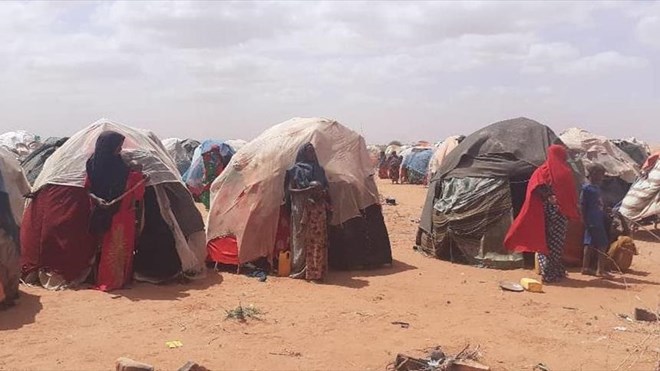
Hundreds of thousands of people are at risk of dying of hunger, while more than 10 million children are facing acute malnutrition due to droughts and spiraling food insecurity in East Africa, the head of a regional bloc said on Friday.
The East African region is facing its longest dry spell in 40 years and the fourth drought in a decade, according to Workneh Gebeyehu, executive secretary of the Intergovernmental Authority on Development (IGAD).
IGAD, a regional group of East African countries, has eight members: Djibouti, Ethiopia, Somalia, Eritrea, Sudan, South Sudan, Kenya, and Uganda.
“Over 10 million children are suffering from acute malnutrition across six of our member states,” Gebeyehu said at a meeting in Kenya’s capital Nairobi that was attended by ministers from all IGAD members.
Representatives from Sweden, France, EU, the United States Agency for International Development, African Development Bank, and UN agencies were also present.
“Tremendously high rates of acute malnutrition continue to be recorded across the region, particularly in Ethiopia, Kenya, Somalia and Uganda, and especially among displaced populations,” he said.
Almost 13 million people are currently internally displaced in East Africa, while the region also has some 5 million refugees and asylum seekers, nearly all of whom are food insecure, according to IGAD data.
Gebeyehu said more than 51 million people in seven IGAD states – or almost 20% of the bloc’s population – are estimated to be highly food insecure, including nearly 388,000 people who are at risk of dying of hunger.
IGAD reports indicate southern and southeastern Ethiopia, parts of Kenya, and nearly all of Somalia is witnessing the worst drought in 40 years.
The situation could soon worsen as weather forecasts for the remainder of 2022 are no better, raising the possibility of a record fifth consecutive season of below-average rainfall in the region, according to IGAD.
The bloc urged regional governments to “identify root causes of food insecurity in order to formulate and execute context-specific and cost-effective solutions.”
IGAD member states must also enhance food and nutrition analysis capacity, early warning and systems, and shift toward climate-sensitive approaches to development, Gebeyehu added.
Biden finalizes new rules for US drone strikes
Biden finalizes new rules for US drone strikes

Source: CNN, By Katie Bo Lillis, CNN
Saturday October 8, 2022
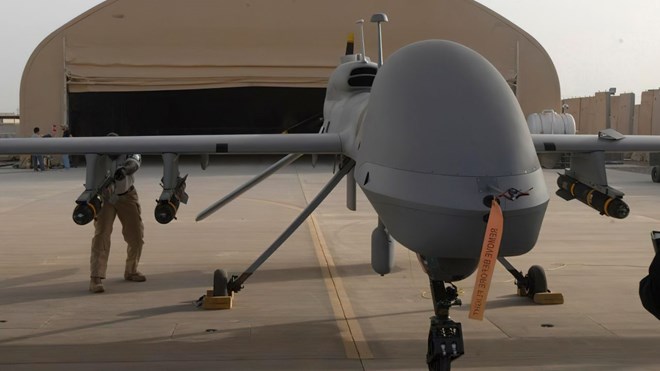
In this image provided by the US Army, contactors from General Atomics load Hellfire missiles onto an MQ-1C Gray Eagle at Camp Taji, Iraq, on February 27, 2011.
President Joe Biden has signed a long-awaited classified policy tightening the rules for the CIA and the Pentagon to carry out deadly drone strikes and commando raids conducted outside of traditional war zones, US officials said on Friday.
With only Iraq and Syria still considered by the US to be so-called areas of active hostilities – or conventional war zones – the new policy is geared toward countries like Somalia, Yemen and now, Afghanistan, where the US continues to carry out counterterrorism strikes from afar.
In practice, the new policy signals that the US is limiting its reliance on drone strikes, once a ubiquitous counterterrorism tool that has drawn increased criticism in recent years in the wake of a series of high-profile revelations about civilian casualties.
The new policy requires the president’s approval before a lethal drone strike or commando raid can be launched on a particular counterterrorism target, according to a senior administration official – and that individual must be named, although the policy does allow the president to waive that and other requirements at his discretion. The president must also approve which groups in which countries are considered to have potential targets as members.
The New York Times first reported on the new rules.
It also institutionalizes a series of standards for taking action against a target, including that counterterrorism operators must establish with “near certainty” that there will be no civilian casualties in the strike, and that the target poses a continuing, imminent threat to the United States.
The policy also requires operators to obtain permission from the State Department’s chief of mission in the country in question, the senior administration official said.
White House Homeland Security adviser Liz Sherwood-Randall, who spearheaded the nearly two-year review which led to the new policy, said in a statement that the guidance “directs [the Biden] Administration to be discerning and agile in protecting Americans against evolving global terrorist challenges” and “requires that U.S. counterterrorism operations meet the highest standards of precision and rigor, including for identifying appropriate targets and minimizing civilian casualties.”
In Syria and Iraq, where the US maintains a military presence, commanders in the field will continue to have more discretion on operational decisions.
Biden had quietly put in place many of the limitations that the new policy now formalizes when he took office. The policy now officially reverses a loosening of Obama-era rules under then-President Donald Trump, which had pushed authority for approving lethal strikes down the chain of command.
“I think this is overwhelmingly a return to a rigorous process, to an intel-heavy consideration of targets and [an] intense role for the president himself in approving the use of this particular tool,” the senior administration official told CNN.
Some counterterrorism operators and analysts have likely chafed at the tightened restrictions, sources familiar with the deliberations over the new rules say. But the broader shift in US priorities away from counterterrorism and toward competition with China and Russia – and the increased political scrutiny on civilian casualties – to a certain degree makes the changes inevitable, these people said.
The new policy follows a separate Pentagon initiative announced in August designed to help reduce the number of civilians killed and injured by US military operations, particular drone strikes.
The US military has been criticized for years for killing civilians in drone strikes but came under increased scrutiny after the military conducted a botched strike during the chaotic withdrawal from Afghanistan last August that killed 10 civilians, seven of them children.
The department also faced criticism over a 2019 airstrike in Syria that killed multiple civilians. The military acknowledged the deaths in that strike in November 2021, after The New York Times reported them. The department ultimately held no one accountable for the 2019 strike.
The Pentagon action plan is tasked with building a framework that will put people who are trained to consider civilian harm issues throughout the military, both in combatant commands and at more senior levels of the Defense Department.
US military drone strikes have dramatically decreased in recent years in many of the countries that the new policy impacts. According to data maintained by the Foundation for the Defense of Democracies, there have been no US drone strikes in Pakistan and Yemen since 2018 and 2019, respectively. In Somalia, US drone strikes in Somalia have dropped precipitously since Biden took office.
But although the military is required by Congress to disclose data about its counterterrorism strikes, including civilian casualties, the CIA is not – making it much more difficult to judge how its operations have shifted over time.
Some former intelligence officials take it a step further, claiming that CIA drone strikes kill far fewer civilians that the military’s – but because the agency’s figures aren’t public, and outside groups that track drone strike casualties say the US military routinely undercounts its collateral deaths, an accurate comparison is difficult to draw.
Resumption of Ethiopian Peace Talks?
Resumption of Ethiopian Peace Talks?
Source: Reuters published on 5 October 2022 an article titled “Ethiopia Accepts African Union Invitation to Peace Talks” by Giulia Paravicini.
The Ethiopian government has accepted an invitation from the African Union to participate in peace talks with Tigrayan officials. Olusegun Obasanjo will lead the talks supported by Uhuru Kenyatta. The Tigray People’s Liberation Front said it is unaware of any imminent talks.
